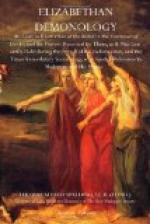[Footnote 1: Froude, History of England, cabinet edition, iii. 102.]
[Footnote 2: Calfhill, pp. 317-8. Parker Society.]
30. Here we have a distinct charge of devil-worship—the old doctrine cropping up again after centuries of repose: “all the gods of our opponents are devils.” Nor were the Catholics a whit behind the Protestants in this matter. The priests zealously taught that the Protestants were devil-worshippers and magicians;[1] and the common people so implicitly believed in the truth of the statement, that we find one poor prisoner, taken by the Dutch at the siege of Alkmaar in 1578, making a desperate attempt to save his life by promising to worship his captors’ devil precisely as they did[2]—a suggestion that failed to pacify those to whom it was addressed.
[Footnote 1: Hutchinson’s Essay, p. 218. Harsnet, Declaration, p. 30.]
[Footnote 2: Motley, Dutch Republic, ii. 400.]
31. Having thus stated, so far as necessary, the chief laws that are constantly working the extension of the domain of the supernatural as far as demonology is concerned, without a remembrance of which the subject itself would remain somewhat difficult to comprehend fully, I shall now attempt to indicate one or two conditions of thought and circumstance that may have tended to increase and vivify the belief during the period in which the Elizabethan literature flourished.
32. It was an era of change. The nation was emerging from the dim twilight of mediaevalism into the full day of political and religious freedom. But the morning mists, which the rising sun had not yet dispelled, rendered the more distant and complex objects distorted and portentous. The very fact that doubt, or rather, perhaps, independence of thought, was at last, within certain limits, treated as non-criminal in theology, gave an impetus to investigation and speculation in all branches of politics and science; and with this change came, in the main, improvement. But the great defect of the time was that this newly liberated spirit of free inquiry was not kept in check by any sufficient previous discipline in logical methods of reasoning. Hence the possibility of the wild theories that then existed, followed out into action or not, according as circumstances favoured or discouraged: Arthur Hacket, with casting out of devils, and other madnesses, vehemently declaring himself the Messiah and King of Europe in the year of grace 1591, and getting himself believed by some, so long as he remained unhanged; or, more pathetic still, many weary lives wasted day by day in fruitless silent search after the impossible philosopher’s stone, or elixir of life. As in law, so in science, there were no sufficient rules of evidence clearly and unmistakably laid down for the guidance of the investigator; and consequently it was only necessary to broach a novel theory in order to have it accepted, without any previous serious testing. Men do not seem to have been




